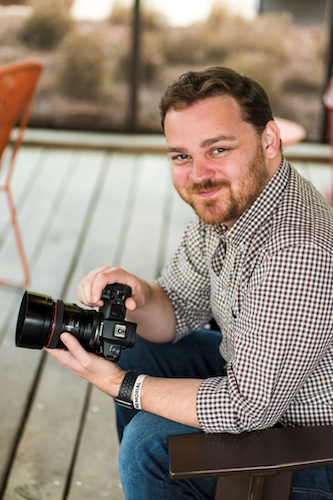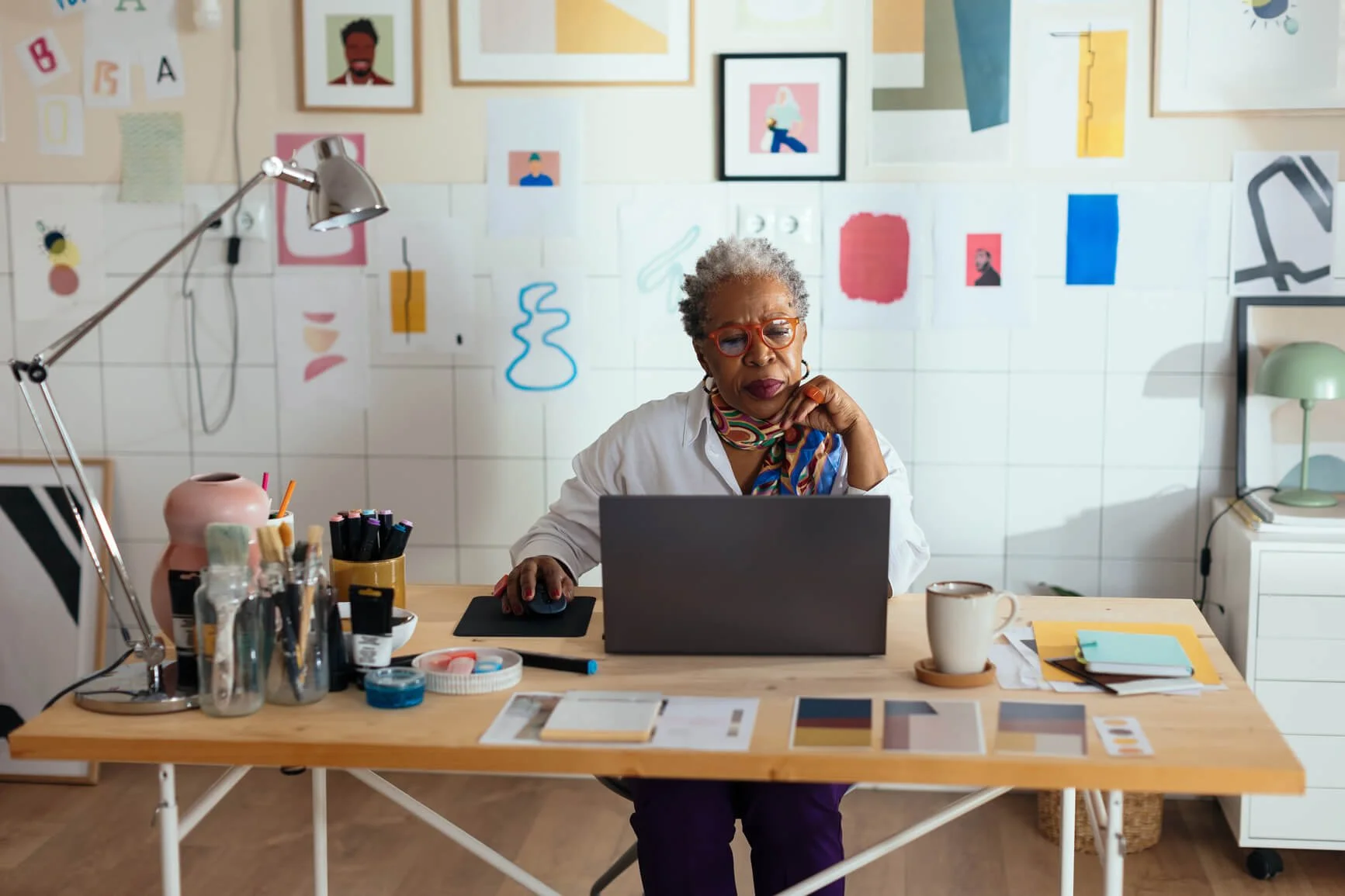Boss Moments: A Side Hustle Pro
This week I am excited to share our 2nd interview from our new blog series, Boss Moments. This interview is with Mike Glatzer, a portrait photographer based out of Atlanta. Mike works full time as a product development engineer and has also successfully run a photography business as a side hustle for the last 8 years. With this, he has learned many things about increasing productivity, finding and creating your own inspiration, and how to deal with comparison in this digital age. Mike is a wealth of knowledge and shares some insight that I wish I knew when I was doing freelance photography. I hope you enjoy this interview with Mike!
Interview:
Introduction Questions:
B: What is the most pivotal or defining moment in your career?
M: Being told I was shooting my cousin's wedding without asking if I could and without having any prior experience. I had just graduated from college with my engineering degree and had already turned down several wedding photography requests. I was primarily a sport and wildlife photographer, having shot Georgia Tech football games and traveling around the country taking pictures of birds and beasts with my uncle. As Vice President of the Georgia Tech photography club, I had to learn how to shoot portraits and learn off camera flash to teach workshops. I started doing some portrait work after college but never intended on doing weddings. Well, eight months before my cousin was getting married, I found out I was going to be her photographer. Some cursing later, I hopped onto a photography forum and posted in a local wedding group, asking if I could second shoot with someone to gain experience. Three weddings later I shot my cousin's and did an admirable job. I shot weddings for six more years as my primary photography niche, and I'm so grateful for that experience. You learn A LOT as a wedding photographer - client management, speed posing, recognizing light instantly, learning what gear works or is just a gimmick, and how to trust yourself. Without the madness and stress that is wedding photography, I wouldn't be the same photographer or freelancer I am today.
B: What has been the biggest hurdle(s) in running your business and how has it grown you and your business?
M: Balancing a day job with being a freelance photographer and marketing my photography. Using an automated CRM really gives me a lot more time to focus on editing, taking care of my photo clients, and marketing. I may not be the best marketer, but I wouldn't have time to even attempt it if I was stuck doing all the backend work for my business! The other benefit of an automated CRM is now I have brain space to be creative and do other things.
Main Questions:
B: What is the most successful decision you have ever made?
M: Getting CRM software. I work a full-time job as a product development engineer, which means I usually have a pretty routine 7AM-3PM schedule. But unlike most freelance photographers, that means I only have 3-4 hours a day to get work done during the week (editing, planning and managing multiple client photography projects simultaneously, blogging, scheduling my social media feeds, client consults, and marketing) for my photography business. So that means every minute is critical and needs to be productive. Having a CRM software allows my brain to focus on things that actually require brain power. Things that don't: routine emails, scheduling consults, asking for timelines, sending feedback surveys, managing project timelines, and task management. I don't want to balance all of that in my head when blogging, editing, marketing, and actually photographing are where all my brain power should be. With a CRM, the routine stuff is covered, and I can focus on providing the best experience for my clients by optimizing my time and energies to the things that matter. I immediately noticed my stress levels decreased, my productivity as a whole increased, and my clients were way happier with the service I provided.
B: Do you have a favorite failure moment?
M: Yeah, sending a feedback survey 5 minutes before a client asked for a reshoot. NOT FUN. I quickly changed my order of operations to send a product delivery contract before sending a feedback survey. Client says, "yay or nay, I'm happy with the final product," and then I can act accordingly. That conversation left some scars.
B: Knowing what you know now, what would you have done differently in the early stages of your business?
M: Gotten better at networking and understanding what my clients needed to feel safe and trust me. I'm someone who grew up thinking, "If you work hard, good things will happen." So I bust my ass all the time - I'm hardly sitting still, and I hate it when I am. Unfortunately, hard work isn't just mastering your craft and building an SEO-perfect website. Making real connections with vendors, creatives in the same field, random businesses and strangers, and especially your clients is what makes a business grow fast. As for clients trusting me and feeling safe? There's this belief among new creatives that if you put your work on your website and post to Instagram a bunch, people will simply flock to your inbox asking to hire you. Being good at your craft shows you can do the job. Providing an experience where the client feels taken care of, safe, and believes that you will do everything in your power as their choice of vendor to go above and beyond to satisfy their needs is everything. It really changes how I speak and write on my various platforms and in person.
B: What is the best advice you have received in regards to running your own business?
M: 1. Get off your butt and interact with people. 2. If you want people to buy something, you have to show it to them.
B: What is some bad advice you have heard from others in and around your career?
M: Right now, the biggest issue is, "you gotta hustle all the time." I think the creative freelance industry is confusing "busy" with productive. There's a thought process that you have to be on every social media platform, at every networking event, [and] in every facebook group on top of blogging every day. Find the 2 or 3 mediums that you enjoy using that also attract clients. Focus on those, keep improving your craft and client experience, and never stop learning. Complacency is death in today's technological society. This industry is so saturated with coaches, presets, and how-to guides from people who aren't even profitable in their businesses and have only been around for 2 or 3 years. Why are we accepting advice and trusting the future of our work with essentially an amateur? And why do we feel that we can spout our minimal experience as evidence of expertise? It's unfortunate because technology today has made learning so easy, fast, and cheap; but we have to be extra careful nowadays with whom we place our time, money, and trust because it is so easy to be labeled an educator.
B: When you feel uninspired or unfocused, how you get back on track?
M: Go for a walk, read a book, or pick up my camera. Creating some space, putting things down (especially technology) for an hour is a great way to recharge, especially if there's some form of exercise involved. I'm a huge book nerd - whether it be social behaviors, murder mysteries, white papers on the latest dinosaur fossil find; you name it, I'm reading it. Books are inherently imaginative, so it's great to use them for inspiration. And since I'm a photographer, I've found that even when I don't feel inspired that picking up a camera and shooting something, anything is still helpful and usually gives me ideas in the moment. If I'm ever bored or feeling out of sorts, my first thought is, "I need to grab my camera and photograph something."
B: What is something you have to constantly remind yourself?
M: If someone else isn't in the muck doing work like mine or is a potential client, then their opinion doesn't matter. Theodore Roosevelt has a fantastic quote referred to as the "Man in the Arena" that this thought is based. With social media and whatnot, we can't help but compare ourselves and our businesses to others and in turn, allow others to influence our work and our opinions. Realizing that I don't have to listen to everyone, that not everyone's criticisms have value, and that comparison is the thief of joy, all help me stay focused and enjoy the work that I'm producing.
Bonus:
B: What book would you gift someone to improve their business?
M: "It Doesn't Have to Be Crazy at Work" by Jason Fried & David Heinemeier Hansson
B: In regards to growing your business, what is one habit you wish you would have developed?
M: Effective networking and marketing
B: What is the best investment under $200 you have made for your business?
M: Photomechanic. It's software for culling and sorting images. It now takes me 30 minutes to sort 3,000 images to 750 vs. 3 hours previously.
B:Other than Dubsado, what app do you use most frequently for your business that you think others should use?
M: Quickbooks. Having your accounting in order with taxes, mileage, and exemptions automatically calculated with reminders to make your quarterly payments is gold. And if you're a business owner, you should be checking your numbers religiously.
B: What podcast is a required listen for business owners?
M: Chase Jarvis Live is outstanding. I'd also recommend Akimbo by Seth Godin
Conclusion:
Thank you to Mike for being willing to share your journey as an entrepreneur with us! If you have a story you would like to share, please reach out to blake@dubsado.com or share your story by tagging @mydubsado on your socials along with #BossMoments.




